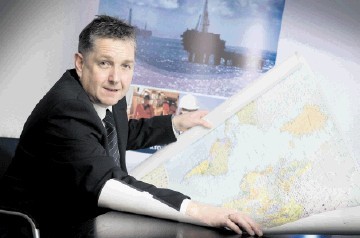
A major new global opportunity has opened up for the UK’s Offshore Industry Petroleum Training Organisation (Opito), with producing counties and national oil corporations (NOCs).
It was in 2009 that Opito blazed a trail by offering the North Sea safety competence standard worldwide, with companies in 40 countries having adopted it since; more than originally anticipated.
But several national governments and NOCs (national oil corporations) have now asked to adopt the Opito standard for skills training and not just safety. Iraq, Oman, Malaysia and East Timor have already approached group CEO David Doig for assistance.
Not only will this have a major impact on the not-for-profit organisation’s international standing, creating an unexpected growth opportunity, it will enable local industry workers skilled to Opito-accredited benchmarks to work outwith their home country.
“The original strategy was to introduce safety-related standards where none existed across the globe,” Doig told Energy.
“That’s why we launched Opito International in 2009 in the belief that it was a five-six years mission. We’ve seen huge growth in that market and we’re now in 40 countries.
“However, there is growing pressure in many countries to develop skills locally, but to a known and trusted standard,” said Doig, highlighting Petronas of Malaysia as an NOC that is keen to apply much more than just the original UK safety benchmark.
“They see the whole standards piece; including technicians being qualified and accredited to Opito standards. Not only does this qualify them for their home country, they can travel the world.
“Malaysia’s a great example. They (Petronas) cannot move anybody because their current learning and development schemes don’t have the credibility.
“It’s a real change in the marketplace for us,” said Doig.
“All around the world where there are emerging oil & gas basins, there are lots of people but no standards.
“Originally countries like Ghana and Qatar were looking for basic safety standards. We don’t train per se but work with the training providers to implement the standards.
“But the new dimension . . . and we didn’t push it, is that governments and national oil companies (NOCs) are asking us in for talks. They said: ‘We need your help, your guidance, your skills frameworks.’
“Now, oil ministers in a growing number of countries are saying that their skills infrastructure will be built on the Opito model for the nation. This will easily be a three-to-five year project for us. Someone will have to go to East Timor and stay there; similarly Oman.
In Oman’s case, the Arab Spring may have had some impact. Local young people were finding themselves bypassed as oil companies and their contractors tended towards the use of ex-pats.
“The Omani government contacted Opito, linking us in with the country’s oil and gas producers.
“They want us to look at their existing skills training infrastructure . . . further education colleges for example. We’re going to assess their whole educational system where relevant.
“We’ll do the general assessments, then we’ll do the technical assessments, and they we’ll put in place the framework needed for them to deliver Opito qualifications.
“I never saw this coming, when we kicked off Opito International. It tells me two things: the products are pretty good and the reputation is very good. We really are becoming the standard-setting body for the global oil and gas industry.”